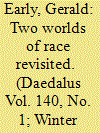| Srl | Item |
| 1 |
ID:
102136


|
|
|
|
|
| Publication |
2011.
|
| Summary/Abstract |
The 1965/1966 Dcedalus issues on "The Negro American" reveal how America's racial future was imagined nearly a half-century ago, and at least one of the prophecies - voiced by sociologist Everett C. Hughes - found its fulfillment in an unexpected way at President Obama's inauguration in 2009. Short stories by Amina Gautier ("Been Meaning to Say" and "Pan is Dead"), Heidi Durrow's novel The Girl WhoFellfrom the Sky, plays by Thomas Bradshaw (Strom Thurmond Is Not a Racist and Cleansed), and poems by Terrance Hayes ("For Brothers and the Dragon" and "The Avocado") suggest trends in recent works by African American authors who began their publishing careers in the twenty-first century.
|
|
|
|
|
|
|
|
|
|
|
|
|
|
|
|
| 2 |
ID:
102121


|
|
|
|
|
| Publication |
2011.
|
| Summary/Abstract |
In 1965, Daniel Patrick Moynihan, then an official in the Johnson administration, published The Negro Family: The Case for National Action, better known as the Moynihan Report. He was influenced by his participation in two conferences organized by the American Academy of Arts and Sciences in the mid-1960s, as well as two issues of its journal Dceda-lus, on the topic of "The Negro American." Arguing that the "damaged" family structure of African Americans would impede efforts to achieve full racial equality in the United States, the Moynihan Report launched an explosive debate that helped fracture a fragile liberal consensus on civil rights. Geary examines the report alongside the Dcedalus project, establishing its roots in the racial liberalism of the mid-1960s and connecting it to efforts by liberals to address the socioeconomic dimensions of racial inequality. He considers the close relationship between scholarship and public policy that existed at the time and reflects on the ways liberal ideas about race have changed in the decades since.
|
|
|
|
|
|
|
|
|
|
|
|
|
|
|
|
| 3 |
ID:
102116


|
|
|
|
|
| Publication |
2011.
|
| Summary/Abstract |
Nearly fifty years ago, the American Academy organized a conference and two issues of its journal Dcedalus on the topic of "The Negro American." The project engaged top intellectuals and policy-makers around the conflicts and limitations of mid-1960s liberalism in dealing with race. Specifically they grappled with the persistent question of how to integrate a forced-worker population that had been needed but that was socially undesirable once its original purpose no longer existed. Today racism has been discredited as an idea and legally sanctioned segregation belongs to the past, yet the question the conference participants explored - in essence, how to make the unwanted wanted - still remains. Recent political developments and anticipated demographic shifts, however, have recast the terms of the debate. Gerald Early, guest editor for the present volume, uses Barack Obama's election to the presidency as a pretext for returning to the central question of "The Negro American" project and, in turn, asking how white liberalism will fare in the context of a growing minority population in the United States. Placing his observations alongside those made by John Hope Franklin in 1965, Early positions his essay, and this issue overall, as a meditation on how far we have come in America to reach "the age of Obama" and at the same time how far we have to go before we can overcome "the two worlds of race."
|
|
|
|
|
|
|
|
|
|
|
|
|
|
|
|